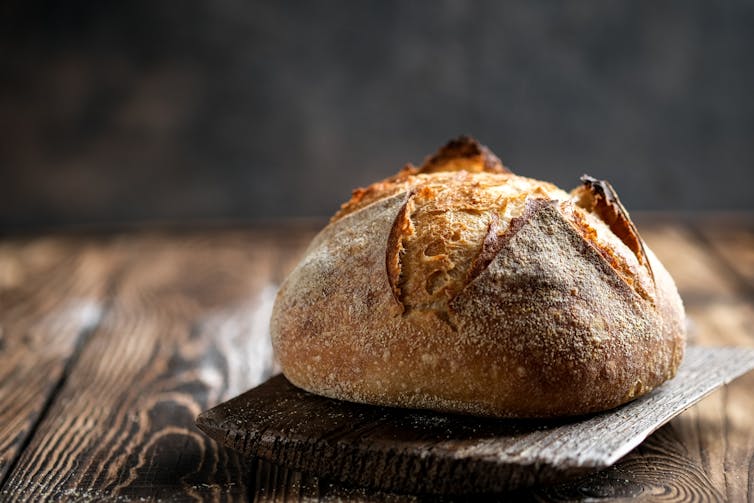What did 2020 teach us about the way we eat?
- Written by The Conversation
Pasta. Rice. Tinned tomatoes. All staples that, prior to 2020, most of us never thought would be in short supply[1].
This year has taught us a lot, including about food and what it means to us. It’s also highlighted just how differently modern Australians behave in relation to food, especially when comparing our behaviour during the COVID-19 pandemic to past crises.
The Depression took place in a much more homogeneous Australia than today, where everyone enjoyed the same repertoire of standard dishes. Everyone made a Sunday roast and then made it last for the next few days.
As the COVID-19 pandemic hit Australia, we were forced to examine many of our social and cultural assumptions. When it comes to food, we are used to having anything we want at any hour of the day, in any season.
Our food choice has expanded exponentially in the past century. Our basic pantry[2] of cooking essentials is more than double what is was 100 years ago.
So why did we hoard? Yes, probably out of panic, but also because we are so used to having plenty that we no longer have the skills to substitute nor, perhaps, the determination to just “make do”.
Where do we get our food?
2020 has also shown us how the way we eat relies on global, not local, systems. During the Spanish Flu pandemic and the Depression, almost all our food was grown, produced, processed and packaged in Australia.
Read more: How many people can Australia feed?[3]
Today, we are a net importer[4] of seafood. We’re also a net importer of some canned products, such as pineapple[5]. Yes, a lot of our food comes from New Zealand, but a significant percentage[6] also comes from America and China, Thailand and Cambodia.
As we’re seeing now, a heavy reliance on imports doesn’t only affect us during a health crisis like COVID, when freight becomes an issue: the current trade challenges[7] we are having with China also show us how geopolitics can affect a country’s food supply.
Sourdough — not for everyone
With the pandemic as our backdrop, several practices changed for us this year. As supply chains recalibrated (after that initial toilet paper panic) and we could mostly buy what we needed, we continued to cook or bake more – although this was nuanced by privilege.
 During the pandemic, pictures of homemade loaves have flooded social media feeds. www.shutterstock.com
During the pandemic, pictures of homemade loaves have flooded social media feeds. www.shutterstock.com
Making bread at home is wonderful, but making sourdough bread[8] (an exercise requiring patience, attention and time) was not an option for everyone.
It was those with the means, and the capacity to work at home — without too many caring [9]and home schooling responsibilities — who could indulge in this gourmet foodstuff.
Read more: Great time to try: baking sourdough bread[10]
In 2020, this new connection to food was confined to a certain group of people, who might be described as having both cultural and gastronomic capital.
The case for greater self-sufficiency
Another positive longer-term shift for our food culture may come with the current (COVID-amplified) trend to relocate[11] to regional and rural areas. Growing your own vegetables was encouraged during the Depression, and it’s far easier to do on a large rural block than a small urban one.
In the 1950s, home production[12] was 46% of our total production of eggs. There has been a call for some time[13] for more self-sufficiency[14] in Australia. But we’ve also had policies where our most valuable seafood[15] goes overseas because people there are willing to pay more for it than people here. We also export about 30% of our cherries[16].
This needs to change, but it comes down to all of us being prepared to pay more for our food. We are so used to buying based on the cheapest price – a habit the supermarkets have fostered. If we want to permanently become more self-sufficient, we have to get rid of this cheap food mentality and pay a proper price for our food.
How can we use food to stay connected at Christmas?
If there was ever a time to think about these issues, it’s now. As we sit down for a meal with friends and family over the holiday season, many of us will be looking for the experience of “commonsensality” — the shared connection made with others through food.
 When we share special food, we can also share memories. www.shutterstock.com
When we share special food, we can also share memories. www.shutterstock.com
Eating “together” can happen virtually — sitting in our respective locations enjoying the same meal, even if far apart. Dishes can inspire shared memories, as evidence of the connection that food gives us in good times and bad.
Maybe this is an old family recipe, or a traditional dish. Maybe it’s just prawns and mangoes.
Of all the things we want to leave behind in 2020, a better understanding of where our food comes from, and how it connects us, are changes worth keeping.
Barbara Santich also talks about how food connects us on the Seriously Social podcast[17] by the Academy of the Social Sciences in Australia.
References
- ^ short supply (www.smh.com.au)
- ^ basic pantry (media.healthyfood.com)
- ^ How many people can Australia feed? (theconversation.com)
- ^ net importer (www.agriculture.gov.au)
- ^ pineapple (www.horticulture.com.au)
- ^ significant percentage (esriau.maps.arcgis.com)
- ^ current trade challenges (theconversation.com)
- ^ making sourdough bread (theconversation.com)
- ^ too many caring (theconversation.com)
- ^ Great time to try: baking sourdough bread (theconversation.com)
- ^ trend to relocate (www.abc.net.au)
- ^ home production (www.ausstats.abs.gov.au)
- ^ call for some time (theconversation.com)
- ^ more self-sufficiency (www.smh.com.au)
- ^ valuable seafood (theconversation.com)
- ^ cherries (www.cherrygrowers.org.au)
- ^ Seriously Social podcast (podfollow.com)

















